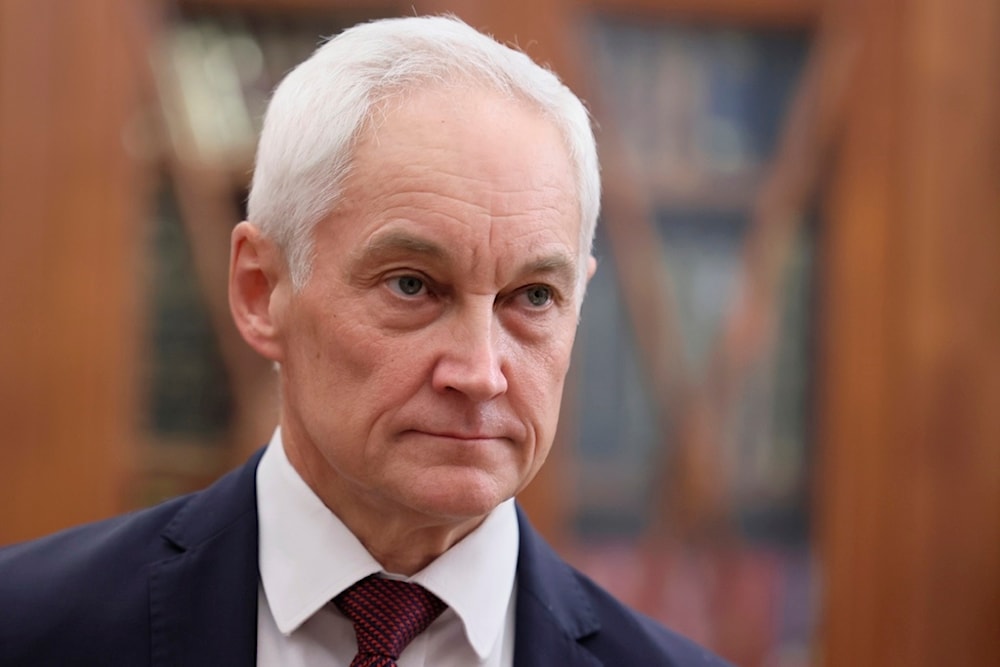Andrei Belousov as Russia's Defense Minister; what does it signify?
Russian President Putin's appointment of Andrei Belousov as Minister of Defense signifies a strategic shift toward integrating advanced economic and technological expertise into Russia's military leadership.
-

Then-Russian First Deputy Prime Minister Andrei Belousov speaks to Russian President Vladimir Putin during their meeting at the Kremlin, in Moscow, Russia, Tuesday, Nov. 7, 2023. (AP)
Russian President Vladimir Putin made adjustments affecting several government positions, notably changing the Minister of Defense, Sergei Shoigu, and appointing Andrei Belousov in his place, following Belousov's previous roles linked to the country's economic affairs.
When addressing Putin's proposal to appoint a civilian figure as the head of Russia's Ministry of Defense instead of a military one, the Kremlin emphasized that the Ministry "must be completely open to innovation and the introduction of any advanced ideas."
According to Al Mayadeen's Moscow bureau chief Muslim Shaito, appointing Belousov as Minister of Defense carries significant strategic implications, both at the economic and political levels. Belousov is recognized as a key figure in Russia's economy, having contributed to the development and integration of advanced technologies, including drones, into the Russian economy.
The development of Russian military production is among the primary reasons for Belousov's appointment to the Ministry of Defense, according to Shaito, who noted that Russia is facing a long and complex war in Ukraine, demanding new technologies and updates to the military machine in line with current war scenarios.
Shaito further explained that Putin's decision represents readiness for an entirely different phase of war, involving high-precision technologies and the reconfiguration of the military institution based on objective technical needs.
Military and civilian economies linked through Belousov
Additionally, this appointment aims to link military economics with civilian economics, addressing the historical separation between Russia's military and civilian sectors since the Soviet era, thereby reducing dependence on Western economies and overcoming the negative effects of Western sanctions.
Belousov, known as a popular figure free of any corruption accusations, is expected to tackle wastage issues, particularly after the arrest of a former Deputy Minister of Defense, according to Shaito.
Sergei Shoigu promoted to the National Security Council
In the same context, Shaito observed that the budget of the Ministry of Defense is likely to increase significantly, possibly reaching between 5% and 6% of Russia's national income, necessitating an experienced and organized economist to manage this process efficiently and without corruption.
As for Sergei Shoigu, he is appointed as the Secretary of the National Security Council, replacing Nikolai Patrushev, whose new position will be announced in the coming days by the Kremlin.
According to Al Mayadeen's Moscow bureau chief, Shoigu's move to the National Security Council is also seen as a promotion, as the council serves as Russia's "mini-government" or "security government" chaired by Putin.
Shaito explained that this council leads [the course of] life in the country, at the political and security levels, and it discusses strategic issues related to security and economics during its weekly meetings.
Patrushev, on the other hand, will undoubtedly move to another important role, as he is considered one of the key figures in the Russian leadership, Shaito added, noting that Patrushev's son was appointed as Deputy Prime Minister in the new cabinet having served as the Minister of Agriculture.
Read more: Russia ready to settle Ukraine war on battlefield if West wants so

 3 Min Read
3 Min Read









